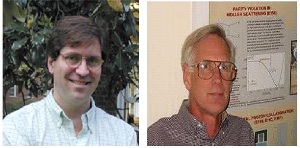Jul 2 2014
More than 80 physicists from around the world will converge at the lakeside village of Skaneateles in Central New York for a weeklong scientific conference.
Known as PAVI 14, the conference will address recent breakthroughs in modern nuclear physics, with emphasis on parity violation and Hadronic structure. PAVI 14 will take place at various venues, including the Stella Maris Retreat and Renewal Center, July 14-19.
 Gordon Cates & Paul Souder
Gordon Cates & Paul Souder
Among the highlights of PAVI 14 will be a lecture by Gordon Cates, professor of physics at the University of Virginia (UVA), titled “How Exploring Basic Science Leads to Unexpected Technology.” The lecture is Monday, July 14, at 7:30 p.m. at the First Presbyterian Church of Skaneateles (97 E. Genesee St.) and is followed by a reception, catered by the Sherwood Inn and sponsored by Welch Allyn.
To R.S.V.P. for the lecture and reception, contact Kelley M. Huttar at [email protected] or 315-685-4300.
“Gordon Cates is an undisputed leader in atomic, nuclear, and medical physics,” says A. Alan Middleton, professor and chair of physics at Syracuse University. “He understands how fundamental research has led to innumerable applications that impact our lives. This is especially true with nuclear science, which has made many recent contributions to energy production and medicine.”
Middleton is confident that Cates’ lecture will appeal to scientists and lay people alike. That new instruments and technologies are creating enormous potential for other sciences, as well as many practical applications, makes the topic timely, he says.
“Gordon will discuss how nuclear physics has paved the way for such spin-offs as the World Wide Web, medical imaging and hadron therapy in medicine,” Middleton adds. “He will explain how science is an investment that pays enormous dividends.”
In addition to Syracuse University’s physics department, PAVI 14 is co-sponsored by the physics department in UVA’s College and Graduate School of Arts and Sciences; the Thomas Jefferson National Accelerator Facility (a.k.a. JLab) in Newport News, Va.; and the Helmholtz Institute Mainz in Germany.
PAVI 14 is co-chaired by Paul Souder, professor of physics at Syracuse University and a longtime Skaneateles resident, and Kent Paschke, associate professor of physics at UVA.
“We are proud to partner with our sister institution, the University of Virginia, to create a platform for discussion among theoretical and computational physicists,” says Souder, a co-recipient of the 2013 Outstanding Nuclear Physicist Award from Jefferson Sciences Associates (JSA), which operates JLab. “At PAVI 14, we will examine new ideas, address some of the problems of, and solutions to, the research in our field, and promote a high standard of research and educational activities for attendees.”
Past PAVI conferences, which have been held in Greece, Germany and France have addressed dozens of topics; this year’s will be no different. Presentations will explore such wide-ranging areas as atomic and Hadronic parity violation; the standard model of particle physics; the Higgs boson and neutrino particles; and quantum chromodynamics, to name a few.
“PAVI 14 reinforces Syracuse University’s status as a leader in experimental research,” says Souder, who specializes in medium-energy particle physics. “Since much of what we do [at Syracuse University] is interdisciplinary and takes place on the global stage, it’s only fitting that we organize something on this scale.”